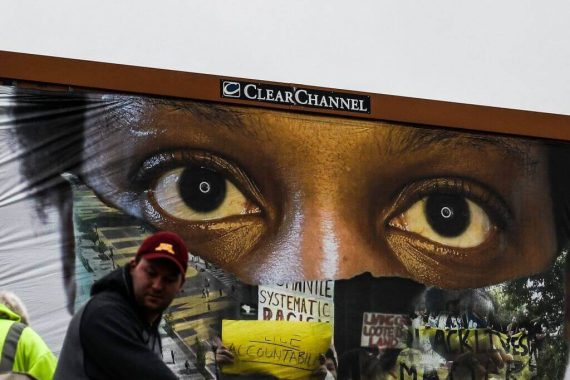God is dead, said Nietzsche long ago. Since then the phrase has been interpreted in many different ways. One is an observation of the collapse of order, the dissolution of hierarchies of power between leaders and followers, teachers and students, parents and children, employers and employees, men and women, news producers and newsreaders—An exponential surge in student protests, and social media interactions of once-newsreaders-now-turned-news-producers, among others, substantiates the argument.
Some call this state of affairs the chaos of postmodernism, an era dominated by a loss of trust in authority, a questioning of power, followed by the belief that with no order, no right and wrong, that every value is necessarily right, every concern as equal as any other; others identify it as the phenomenon of moral and cultural relativism. But dissidents react by saying, ‘Stop! We have to draw the line somewhere! There must be standards!’
The ingenuity of Nietzsche’s statement lies in its prescience. Made at the turn of the twentieth century, it foretells the news headlines we are now privy to, more than one hundred years later. Through the mouthpiece of Zarathustra, Nietzsche warned posterity about the imminent danger of a world that found no merit in hierarchies and dividing lines. Through Zarathustra, Nietzsche reproduced the trope of the quintessential madman in literature. Thus Spake Zarathustra is the story of an unpopular prophet, castigated and excoriated for his cryptic statements, who broaches matters we now know were ahead of his time.

VIDEO: Hashing it Out: Barrett Holmes Pitner on Ethnocide
Nietzsche foresaw the eradication of order, systems, and hierarchies as a preliminary to nihilism; a negation of the individual rather than a longed-for affirmation of the self, which has ironically dominated the political forefront of countries with liberalist agendas. Such an agenda has sought to celebrate individualism, exalt every trait and concern of the individual, in order to allow him/her to grow to be healthy, wholesome, unique. Rather than that, these steps in the direction of caring for individualism, of pushing the liberalist agenda forward by recognizing every trait (and hence creating labels for everything) is fostering a culture of hypersensitivity, drowning the individual in a bucket of labels so that he/she is beginning to matter less and less.
African-Americans feel their identity to be threatened, especially by their White, American counterparts.
These labels do not manifest the ‘Who am I?’, but instead emphasize ‘What am I sensitive about?’ (Interestingly, and quite tellingly, as an indication of how labels are also relative, in Western and Central Europe this aspect of the liberalist agenda that exalts the individual is embraced by right-wing economic liberals and heavily criticized by left-wing radicals, whereas in the US it is resonant with what is seen as the progressive left.)
The growing trend of associating the label of ‘Ethnocide’ on the Black Lives Matter (BLM) movement in the United States has encouraged people from other cultures to wonder whether they are victims of the same phenomenon. Ethnocide it must be recalled, is the practice of destroying the soul of a people, as opposed to genocide which aims at decimating a whole genus or race. Ethnocide is the cultural assimilation of a non-dominant group by a dominant one, and the BLM movement has waved this card because African-Americans feel their identity to be threatened, especially by their White, American counterparts.
And rightly so. If the statistics that display police brutality and abuses of authority are factored in, it would be clear that black lives are not being given the same importance as other lives. But labels can be dangerous, and while the BLM movement is an example of where they have been used for a good cause, there are also instances where labels have been subjected to overuse and abuse.
Take the case of the label of Post-traumatic Stress Disorder (PTSD). ‘Trauma’ once alluded to a physical reaction, but since 1980 it has been included in the term ‘Post-Traumatic Stress Disorder’ (DSM III) to refer to a mental disorder. Its definition was limited to an event that evoked ‘significant symptoms of distress in almost everyone’, and be ‘outside the range of usual human experience’. It was not to be a subjective standard, and had to elicit a severe reaction. It would thus encompass rape, torture, but not divorce or the death of a loved one because the latter were deemed to be part of normal life.
Yet, the distinction between pain and trauma slowly disintegrated. About twenty years ago, ‘trauma’ began to include experiences that were both physical and emotional, roping in a subjective element to is determination. The label of ‘trauma’, or for that matter, ‘PTSD’ is now widely used, furthering the culture of ‘antifragility’, ‘safetysim’, or hypersensitivity that are weakening us.
One point must be stressed upon at the outset: the United States has for a long time been the ‘trend-setter’; the originator of most labels that have in no time, gained currency in other parts of the world. Raphael Lemkin for instance, knew that he had to come to the United States for his cause to gain legitimacy; for the label of ‘genocide’ to be recognized as a punishable crime.
Naturally if this country is where labels usually originate, there is a lot to say about how this process can and has gone wrong, for one of the insights one gains in a thorough study of anything, is that no system, no phenomenon, no process can be perfect.
Recommended
So for example, the sensitivity we have developed to every remotely negative experience/reaction/feeling to external stimulus (of whatever form), and following that, our decision of affixing ourselves with an associative label (among the myriad of those to choose from) has made labelling—or self-labelling for that matter—rather effortless. Many of us now feel that in respecting the sensitivities of the other (to avoid the other from being ‘triggered’), we’re constantly having to walk on eggshells.
These practices of self-censure place barriers on communication, on the freedom of expressing ourselves, and while some groups may feel liberated by being given the chance to speak up, others feel threatened to express themselves in case their speech, or any part of it should encroach upon the sensitivities of an interlocutor.
The result: a constant atmosphere of tension and apprehension in which no speaker is at ease, and where one must necessarily begin with a barrage of disclaimers. (In the past few months, it has now become a requirement on several websites accepting submissions for novels, short stories, and other art work, to insert one or more disclaimers in case content may hurt the sensitivities of the reviewer/s).
Overall, a feeling of malaise seems to have crept in, especially (and ironically) in forums that are meant to foster creative thought and writing, and in the context of free speech, one of the pinnacles of liberalist constitutions, young writers, as validated by Sir Kazuo Ishiguro, seem to be intimidated and silenced.
It is justifiable that certain words should be used carefully, because of their meaning and purport, and the reactions they may stir up in marginalized groups suffering centuries of torture, oppression, and abuse, but the matter is quite another when one has to question whether it is legitimate for a writer from a dominant group to create characters in his/her novel who hail from a non-dominant one.
Questionable when one can no longer feel free to express a violent experience one has endured because it may expose a reader/listener/viewer to violence. If we don’t arm ourselves with our interior defences, or to put it a different way, develop and strengthen our immunity against external attacks, even the slightest, then all these labels, these shields, or the sources of distress they denote, would drown us, weaken us, and expose us to harsher threats later in life.
Ever since the use and increasing popularity of online symptom checkers, it has become common for doctors to face patients who’ve stepped in well-prepared, providing a diagnosis rather than listing complaints about symptoms. Doctors are then compelled to interrupt patients, and ascertain whether the ailment/condition was self-diagnosed, or rather, the result of a professional medical diagnosis.
There are many labels out there, but no system in place for us to be ‘diagnosed’. Self-diagnosis—or self-labelling—and perhaps no overarching authority to monitor the use of these labels, is one of the major problems we suffer from in our contemporary world.
Creating labels a gogo, and especially misusing them, has already been identified by the clairvoyant as problem-laden. In the context of specific labels in psychology, Nick Haslam identifies ‘abuse’, ‘bullying’, ‘trauma’, ‘mental disorder’, ‘addiction’, and ‘prejudice’, as being subjected to similar misuse.
Not surprisingly, a label was created to lament it: concept creep.
A label, in the manner of a soldier’s shield, ought to be used justly and sparingly; it would be unfortunate if one were to experience life in a state of perpetual self-defence. To win the battle (of life, or of justice/equality/representation), at some point, one must set it aside, face the enemy, plunge forward and attack.





